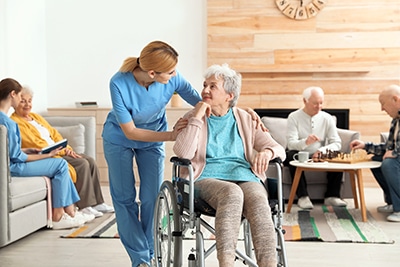At Colorado Help At Home, seniors can experience a multitude of benefits through at-home nursing and healthcare services. This personalized care not only caters to their unique needs but also ensures comfort, convenience, and quality assistance in the comfort of their own homes. These services promote independence, allowing seniors to stay in the comfort and familiarity of their own homes while receiving the necessary medical care. Additionally, at-home care can be personalized to meet individual needs, ensuring that each senior patient receives the attention and therapy they require.
For family members, this setup provides peace of mind knowing that professional healthcare is readily available for their loved ones. Finally, at-home healthcare often proves to be more cost-effective compared to institutionalized care, making it a viable choice for many families.
In-Home Care For Older Adults
In-home care services are tailored to address the unique needs of each individual. They encompass a wide range of services from medical care, such as administering medication, wound care, and physical therapy, to help with daily tasks like bathing, dressing, meal preparation, and household chores. These services not only ensure the health and safety of seniors but also enhance their quality of life by promoting independence and comfort in familiar surroundings.
Some benefits of home care are getting one-on-one attention in their own home the elderly population can get proper personal care and attention from their caregivers. Also since our professional caregivers are in their homes there aren’t strict visiting hours so you can drop by and check on your loved ones whenever.
At-home care services can be temporary or long-term and range from a few hours a day to round-the-clock supervision. It’s important for family members to identify their loved one’s needs first in order to properly select an appropriate care plan.
Benefits Of In-Home Senior Care
The benefits of home care for seniors are numerous, including:
Greater Independence
In home care and nursing services allow seniors to remain independent in their own homes. Many older adults prefer living independently, but certain health conditions or physical limitations may make this difficult. With at-home care, seniors can receive the necessary assistance while still maintaining a sense of independence. This helps them maintain a sense of control and dignity in their daily lives.
Living In Familiar Surroundings
Staying in familiar surroundings has a profound impact on the mental well-being of seniors. Maintaining a connection to their home and community fosters a sense of belonging and continuity, which is often comforting to older adults. This familiarity can also be beneficial from a cognitive perspective, especially for seniors suffering from dementia or Alzheimer’s disease, as it helps them navigate their day with minimal confusion and disorientation.
Even simple things like being in their own bed can do a lot of good. By enabling seniors to stay in their own homes, at-home health care brings this meaningful benefit alongside its array of medical, personal, and practical care services.
Relief For Family Members & Family Caregivers
Family caregivers are often the unsung heroes in the realm of at-home healthcare – providing significant amounts of care and support to their elderly loved ones. They offer assistance with daily activities, manage medications, and often coordinate medical care, all while balancing their own personal and professional responsibilities. The emotional bond and personal history that family caregivers share with the senior patient can greatly enhance the quality of care provided.
However, it is essential that they receive adequate support and self-care opportunities to prevent stress and burnout. Services like those offered by Colorado Help At Home can provide respite and assistance to family caregivers, ensuring that both they and their loved ones get the help they need. We make sure you have a direct line of communication with your loved one’s caregiver.
Combat Mental Health Problems
Mental health problems are a growing concern among seniors, and can significantly impact their overall health and quality of life. Depression and anxiety are common, often as a result of loneliness, isolation, or chronic illnesses. Cognitive disorders like Alzheimer’s and dementia can also pose serious psychological challenges.
At-home healthcare services can play a pivotal role in managing these problems. Regular interaction with caregivers can combat feelings of loneliness, while professional medical care can ensure that mental health disorders are detected early and treated appropriately.
Moreover, the comfort of a familiar environment can alleviate symptoms of anxiety and confusion in seniors, particularly those with cognitive impairments. Thus, at-home healthcare not only addresses the physical health needs of seniors but also offers comprehensive support for their mental well-being. Studies have shown that being social can prevent certain health outcomes and better their emotional health.
Assisted Living Facilities Don’t Have To Be The Answer
Assisted Living Facilities are another option for senior care, providing a community environment with various levels of assistance depending on individual needs. These facilities offer an array of services such as meal preparation, medication management, and assistance with daily living activities. In addition to these, they also provide opportunities for social interaction, recreational activities, and other community-based amenities.
However, while they offer professional care and a sense of community, they may not provide the same level of personalization and familiarity as at-home care services. The choice between at-home care and an assisted living facility relies heavily on the individual needs, health conditions, and personal preferences of the senior. It is crucial to consider all these aspects while making the decision.
Frequently Asked Questions
What is the benefit of having someone to care for an elderly person in their home?
Having someone to care for an elderly person in their home can have numerous benefits. For starters, it allows the individual to stay in a familiar environment, which can be comforting and reduce stress, particularly in those suffering from cognitive disorders like dementia or Alzheimer’s. At-home care also provides personalized care tailored to the individual’s needs and preferences, promoting a better quality of life.
This includes assistance with daily tasks, medical care, and even companionship, which can significantly decrease feelings of loneliness and isolation that are often prevalent in seniors. Additionally, it provides peace of mind to family members, knowing that their loved ones are receiving professional care without having to move to an assisted living facility.
What are the benefits of being a senior caregiver?
Being a senior caregiver offers multiple benefits. It provides a sense of purpose and fulfillment derived from helping others and making a significant difference in their lives. Caregivers often build profound relationships with those they care for, leading to strong emotional connections and shared experiences.
Additionally, it offers opportunities for personal growth and learning, as caregivers often acquire new skills and knowledge in healthcare, communication, and problem-solving. It can also instill a deeper appreciation for life and health, promoting a balanced and compassionate outlook. Despite the challenges and responsibilities it brings, senior caregiving can be a deeply rewarding career or role.
What are the benefits of a care home?
Care homes, also known as residential care, offer multiple benefits for seniors. They provide full-time, professional care for elderly individuals who may find it challenging to manage daily tasks independently. This includes assistance with activities such as bathing, dressing, meal preparation, and medication management. Care homes also offer structured routines that can be especially beneficial for seniors who may become disoriented or confused.
Furthermore, these facilities provide an environment of community and social interaction that can reduce feelings of loneliness and isolation, with regular activities and opportunities for residents to engage with one another. Lastly, care homes offer peace of mind for family members knowing their loved ones are in a safe environment and receiving constant, professional care.
What are the disadvantages of home care for the elderly?
While home care offers many benefits for the elderly, it also has its share of disadvantages. These can include the potential for the elderly person to feel isolated if they don’t have regular social interaction outside of their caregiver, as home care doesn’t provide the communal environment that a residential care home would offer. Furthermore, the quality of care can depend heavily on the individual caregiver, and while there are many excellent home care providers, there can be inconsistencies in care levels.
When you hire an independent nurse or professional caregiver, you assume the duties of an employer. As a result, you will be responsible for managing payroll, taxes, worker’s compensation, unemployment insurance, liability, and some other complicated necessary tasks. Home care also requires a safe and accessible home environment, which may necessitate costly modifications or repairs. Lastly, some elderly people may need more intensive help than home care can provide, and in these cases, a residential care facility might be the better option.




